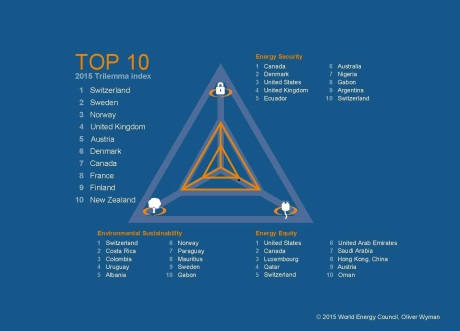There have been overall improvements across the three dimensions of the energy trilemma - energy security, energy equity and environmental sustainability - the latest Energy Trilemma Index from the World Energy Council (WEC) suggests. However, WEC said countries face challenges in developing a balanced approach to their energy policy.
The fifth Energy Trilemma Index, released as part of WEC's annual World Energy Trilemma report, is produced annually in partnership with global management consulting firm Oliver Wyman, along with the Global Risk Centre of its parent Marsh and McLennan Companies. The index ranks the energy systems of 130 countries giving them a score based on how they are balancing the three dimensions of the energy trilemma.
WEC said countries face the challenge of balancing the trade-offs of the trilemma goals and dealing with financing the transformation of their energy systems. The report's findings indicate that the best-performing countries tend to be developed countries with higher shares of energy coming from low- and zero-carbon energy sources supported by well-established energy efficiency programs.
 |
| The top 10 performers in the 2015 Energy Trilemma Index (click to enlarge) |
Just two countries - Switzerland and Sweden - achieved the top AAA score.
Within the security dimension, Canada is once again the highest ranking country, with the USA maintaining the position for most equitable (affordable and accessible) and Switzerland leading the way on the environmental sustainability dimension.
The index includes a 'watch list', highlighting countries that are expected to display significant changes in trilemma performance over the coming years in light of "recent policy changes, unscheduled incidents or undealt with structural issues".
Two countries - South Africa and the USA - have been added to the negative watch list, which in 2014 included Germany, Italy, Japan and the UK. South Africa was added because of its electricity crisis, while WEC says the USA's lack of investment in ageing infrastructure and exposure to extreme weather events pose threats to the country's currently strong energy security.
"Despite the evident challenges faced by each country, Index results for the past five years show signs of progress for all dimensions of the energy trilemma, proving that the transition towards sustainable, balanced energy systems is slowly occurring," the study says.
However, its adds, "While access to energy, the share of renewables in the electricity generation mix, and the rate of energy-efficiency improvements all see positive development, it is clear that progress is still slow, and can only be sped up by creating robust and stable policy frameworks that give certainty to investors."
Joan MacNaughton, executive chair of the World Energy Trilemma study, said: "Our research underlines how priorities vary from country to country - though energy security is key for all. And the report highlights a real issue for the 21st Conference of the Parties (COP21) due to begin later this month in Paris, namely translating the Intended National Determined Contributions from international objectives into national level actions for energy. The investment required is huge, and driving it to the right places will require a balanced approach if countries are to meet the three goals of the trilemma."
She added, "The $48-53 trillion needed for investment in global energy infrastructure is increasingly contingent on a clear climate framework and a global target for emissions. It is clear that the energy industry has embraced the sustainability agenda and is working to help curb greenhouse gas emissions. It has an important role to play in achieving a successful energy transition, but key actions are required by countries if the full potential of the energy sector is to be realized."
Researched and written
by World Nuclear News







_97013.jpg)






